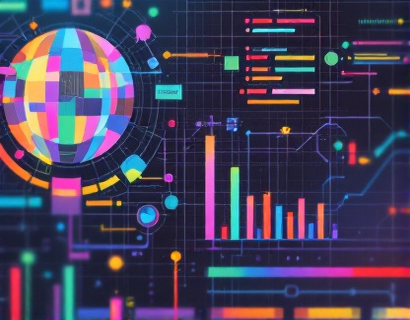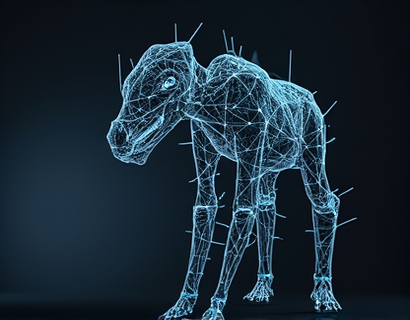Decentralized Authentication: Empowering Businesses with Advanced Security and Seamless Access Through Innovative Solutions
In the digital age, the importance of robust security measures and efficient access control has never been more critical for businesses. Traditional authentication methods, while effective in the past, are increasingly being challenged by the complexity and scale of modern operations. Decentralized authentication solutions are emerging as a transformative force, offering advanced identity management that not only enhances security but also ensures seamless user experiences. This article delves into the intricacies of decentralized authentication, exploring how it is reshaping the landscape of business security and operational efficiency.
Decentralized authentication, at its core, involves distributing the responsibility of identity verification across a network of nodes rather than relying on a central authority. This approach leverages blockchain technology and distributed ledger systems to create a more resilient and secure environment. By eliminating the single point of failure inherent in centralized systems, decentralized authentication significantly reduces the risk of data breaches and unauthorized access.
Enhanced Security Through Decentralization
The primary advantage of decentralized authentication is its ability to enhance security. In a decentralized system, user credentials are not stored in a single, vulnerable location. Instead, they are distributed across multiple nodes, making it extremely difficult for attackers to compromise the entire system. This distribution also means that even if one node is compromised, the overall security of the network remains intact.
Moreover, decentralized authentication often employs advanced cryptographic techniques such as public-key infrastructure (PKI) and zero-knowledge proofs. These technologies ensure that user data remains encrypted and secure, even during transmission. Zero-knowledge proofs, in particular, allow users to prove their identity without revealing any underlying information, adding an extra layer of privacy and security.
Seamless User Experience
While security is a paramount concern, businesses also require authentication solutions that provide a smooth and efficient user experience. Decentralized authentication systems are designed to strike this balance, offering seamless access without compromising on security. One of the key features of these systems is their ability to support multiple authentication methods, including biometrics, smart cards, and passwordless authentication.
Passwordless authentication, for instance, eliminates the need for users to remember complex passwords, reducing the risk of password-related security issues such as phishing and password fatigue. Instead, users can authenticate using a variety of methods, such as fingerprint scans, facial recognition, or one-time codes sent to their mobile devices. This not only enhances security but also improves user convenience, leading to higher adoption rates and increased productivity.
Operational Efficiency and Cost Savings
The implementation of decentralized authentication solutions can lead to significant operational efficiencies and cost savings for businesses. Traditional authentication systems often require extensive infrastructure, including servers, databases, and security personnel to manage and maintain. Decentralized systems, on the other hand, reduce the need for such resources by distributing the authentication process across a network of nodes.
This decentralization not only lowers the operational costs associated with maintaining centralized infrastructure but also minimizes the risk of downtime and service interruptions. Additionally, the automation capabilities of decentralized systems can streamline workflows, reducing the need for manual interventions and further enhancing efficiency.
Scalability and Flexibility
Another significant benefit of decentralized authentication is its scalability and flexibility. As businesses grow and evolve, their authentication needs can change rapidly. Decentralized systems are inherently scalable, allowing organizations to easily add or remove users and adjust access levels without the need for extensive reconfiguration. This flexibility is particularly valuable for businesses operating in dynamic environments or those that experience rapid growth.
Furthermore, decentralized authentication solutions can be integrated with existing systems and infrastructure, making them a viable option for businesses of all sizes. Whether a company is a small startup or a large enterprise, the modular nature of these solutions ensures that they can be tailored to meet specific requirements and seamlessly integrated into the existing tech stack.
Case Studies and Real-World Applications
To better understand the practical applications and benefits of decentralized authentication, let's examine a few real-world examples. One notable case is in the financial sector, where banks and financial institutions are increasingly adopting decentralized authentication to enhance security and comply with stringent regulatory requirements. By implementing blockchain-based authentication, these institutions can ensure that sensitive financial transactions are secure and traceable, while also providing customers with a convenient and secure way to access their accounts.
In the healthcare industry, patient data privacy and security are of utmost importance. Decentralized authentication solutions can help healthcare providers manage patient identities and access to medical records more securely. For instance, a patient can grant temporary access to their medical records to a specific healthcare provider using a decentralized authentication protocol, ensuring that only authorized personnel can view sensitive information.
Another area where decentralized authentication shines is in the realm of remote work and cloud services. With the rise of remote work, ensuring secure access to corporate resources from various locations has become a critical challenge. Decentralized authentication provides a robust solution by enabling secure access control without the need for complex VPN setups or cumbersome password management.
Challenges and Considerations
While the benefits of decentralized authentication are clear, there are also challenges and considerations that businesses should be aware of. One of the primary challenges is the need for a cultural shift within organizations. Adopting decentralized authentication often requires a change in how identity and access management are perceived and implemented. Organizations must invest in training and education to ensure that their teams understand the new systems and can effectively leverage their capabilities.
Another consideration is the technical complexity involved in implementing decentralized authentication solutions. While the end-user experience is typically seamless, the underlying infrastructure requires careful planning and expertise to set up and maintain. Businesses should consider partnering with experienced providers or consulting with experts to ensure a smooth transition.
Future Trends and Innovations
The field of decentralized authentication is rapidly evolving, with ongoing research and development leading to new innovations. One area of focus is the integration of decentralized authentication with emerging technologies such as the Internet of Things (IoT) and artificial intelligence (AI). As more devices become connected and data-driven decision-making becomes more prevalent, the need for secure and efficient authentication methods will only grow.
Another trend is the development of interoperable decentralized identity frameworks that allow for seamless authentication across different platforms and services. This interoperability is crucial for creating a truly connected and secure digital ecosystem, where users can move freely and securely between various online environments.
Conclusion
Decentralized authentication represents a significant leap forward in the realm of business security and operational efficiency. By leveraging advanced technologies and distributed systems, these solutions offer enhanced security, a seamless user experience, and greater scalability. As businesses continue to face evolving security threats and the need for efficient access control, decentralized authentication will play an increasingly vital role in shaping the future of digital identity management.











































